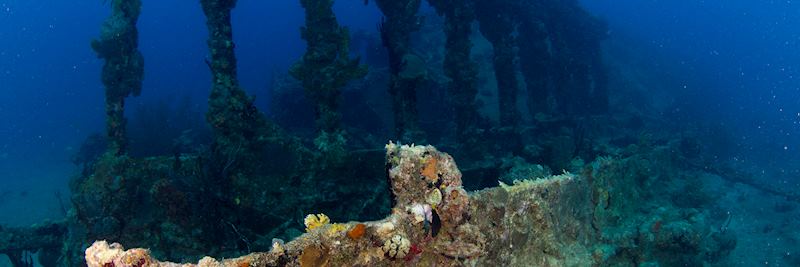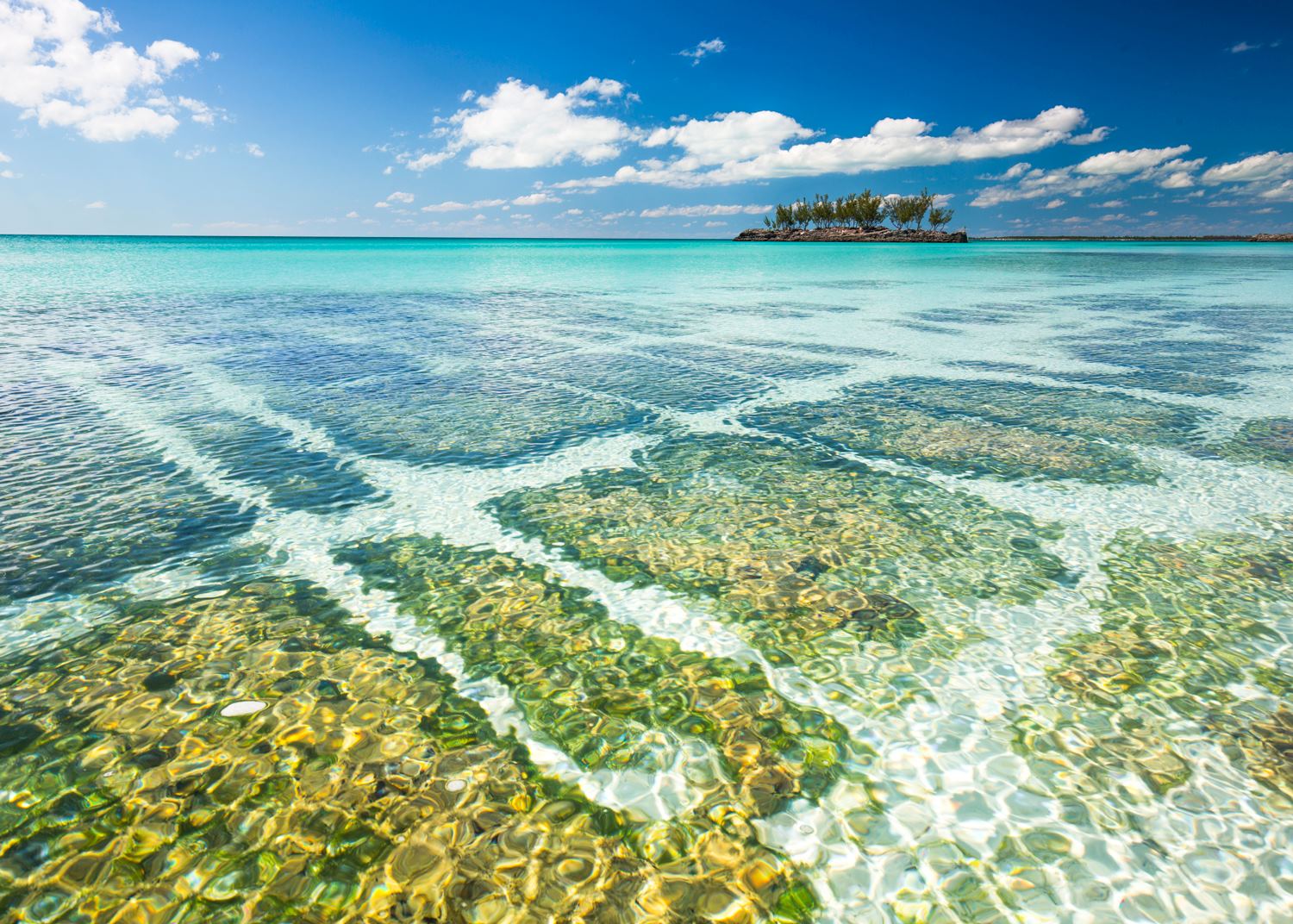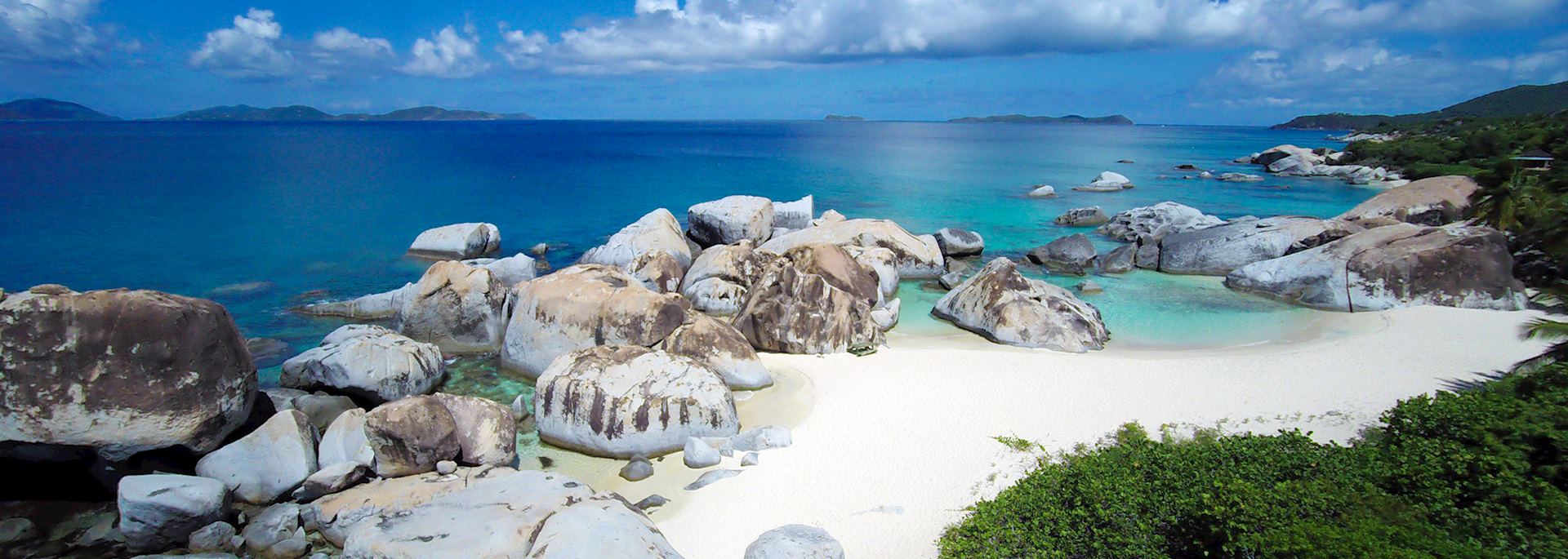Captain Cook was inspired to name the Virgin Islands after their pristine, untouched beauty. Hundreds of years later, the majority of the islands are still immaculate. One of the least developed areas of the Caribbean, the few inhabited islands have become sophisticated island retreats or home to low-key beachside towns.
Explore local life in Road Town

81% of the British Virgin Islands' residents live and work in the capital, Road Town. Dominated by businesses and a busy marina, it’s not the most attractive town on the islands, but a visit is an opportunity to see local life unfold.
Waterfront Drive, the main coastal road, is littered with gift shops and international restaurants. Head to the original heart of the city, Main Street, and you’ll find a pastel-painted row of 18th century wood and stone houses, churches and colonial prison. The Old Government House, at the end of the street, has been converted into a small museum. Local craftsmen and artisans flock to the town to sell their wares in bright wooden cabins alongside sizzling food stalls. Jerk chicken is one of the popular, and delicious, street food dishes sold here.
Follow hallowed pirate trails

From the 16th century, the British Virgin Islands became populated by Dutch and English privateers; men licenced to attack foreign vessels during wartime. The islands were an ideal base from which to plunder heavily laden Spanish ships.
The British claimed ownership in the late 17th century and turned the islands into a bustling area of commerce, trading slaves and sugar. Unlicensed privateers, or pirates, thrived and many of the outer lying islands are rumoured to still conceal chests of gold. Take a day trip aboard a catamaran, or a traditional polished-wood schooner, and you can visit some key pirate haunts.
With little documented history of pirate vessels, much is left to local myth and legend, and on a day’s sail, your ship’s captain will be able to divulge the details. Norman Island is reputed to be named after an 18th century pirate’s captain and is considered to be the inspiration for Robert Louis Stevenson’s Treasure Island. It was a notorious pirate hangout and the islands caves are said to hide a secret code on the walls, leading to treasure.
Soper’s Hole, a conveniently deep and wide harbour on the western point of Tortola, was once the base for Blackbeard’s fleet. Hidden from view of the shipping channel, it enabled him to quickly pounce on incoming galleons. It’s now a busy marina, edged with cafés and restaurants. With names such as the Jolly Roger Inn and Blue Parrot Café, it still has a pirate vibe, even if it is a little artificial. Head here for lunch before sailing to the northern side of the island to find the aptly named Smugglers Cove Beach which is still blissfully undeveloped.
Dive a shipwreck

The gentle currents and clear waters of the British Virgin Islands make ideal dive sites. The relatively calm sea means that few ships were wrecked on the rocks, but with no salvage yards, many have been intentionally sunk when they become unusable. There are many well-reputed dive schools on the island who run dives if you already have your PADI licence. PADI courses are available on the island for new divers, but wreck diving is only recommended for experienced divers.
The wreck of the Royal Mail ship, the RMS Rhone, lies off the coast of Salt Island, caught in an unseasonal storm in 1867. In excellent condition, it’s possible to see cannons and rusted tools, as well as a porthole with intact glass. It’s traditional for divers to rub the window for good luck. The bow is relatively intact with parts of the deck still visible.
Wreck Alley, just off Cooper Island, is the resting ground of four cargo boats and a suitable spot for a first wreck dive. For a more challenging dive, the Chikuzen, a Japanese fishing boat, was set on fire and sunk in 1980. It lies 20 km (12 miles) off the coast of Virgin Gorda and has become a meeting ground for marine life including moray eels and octopuses.
Try the local rum

Rum is ingrained in Caribbean society from locals relaxing after work to visitors enjoying beachside cocktails. Potent homemade rum is popular, as well as varieties from local producers. Callwood Rum Distillery is one of the longest producers of rum and on a visit to the factory on Tortola you can see the traditional techniques still in use today.
Once the official rum producer for the Royal Navy, Pusser's Rum is arguably the longest-running producer in the Caribbean, beginning production in 1655. Deep-seated in naval tradition, it was named after the purser of a ship — the man responsible to allocating ships rations. British sailors were once issued with a tot of rum a day when on active duty.
Rum is served across the British Virgin Islands but head to Road Town on Tortola and you can visit the Pusser's Road Town Pub. Opened in the 1980s, it serves a selection of rum cocktails and rum cake.
Wade among giant boulders on Virgin Gorda

Lumps of volcanic lava flow, smoothed over thousands of years into ginormous boulders, litter the southernmost point of Virgin Gorda. Known as The Baths, they have formed pools and boulder-walled ‘rooms’ to wade through. The tidal pools are a great place for spotting crabs.
Visit early in the morning to leave time to explore the rest of the island, the third largest island in the British Virgin Islands chain. Walking between the boulders to Devil’s Bay Beach is a highlight — splashing in the tidal pools and squeezing around the huge rocks, you will eventually emerge onto a white-sand cove.
Enjoy complete freedom on a private crewed yacht

The British Virgin Islands have been enticing sailors for hundreds of years. Once a playground for pirates, it’s now a haven for yachts and sailboats. The gentle trade winds, calm waters and short distances between islands are perfect for island-hopping.
Chartering your own private crewed yacht, you have the freedom to drop anchor whenever you wish. Your ship’s captain is on hand to help you explore the numerous secluded beaches and coral reefs teeming with marine life.
While the islands are refreshingly undeveloped, there are plenty of onshore restaurants and bars to explore, from oil-drum beach barbecues to fine dining. When you wish to eat on board, your private chef will design dishes tailored to your tastes.
Stay on Guana, a private island

View Guana Island from the sea, and it’s possible to make out its namesake, the iguana shaped rock on the northwest of the island. The eighth largest island in the British Virgin Islands, it’s a rocky 3.5 sq km (1.3 sq mile) island covered in lush rainforest. Once home to a Quaker colony who ran a sugar plantation on the island in the 18th century, it’s now home to a luxury resort. Its largest beach, White Bay Beach is half a mile of silver-white sand, with a few swaying hammocks, a well-stocked beachside honesty bar and small marina.
The island’s other six beaches are only accessible by hiking one of the numerous trails or by boat. The 19 km (12 miles) of walking trails are well mapped and are a great way to explore the ecological diversity of the island. Stout iguana and ground lizards roam freely, and the rare quail dove is commonly spotted. Turk’s cap cacti, frangipani trees and bougainvillea are vibrant additions to the landscape. Flamingos, once hunted to extinction on the island, have been reintroduced.
Start planning your holiday to the British Virgin Islands
Start thinking about your experience. These itineraries are simply suggestions for how you could enjoy some of the same experiences as our specialists. They’re just for inspiration, because your trip will be created around your particular tastes.
View All Tours in The British Virgin Islands


